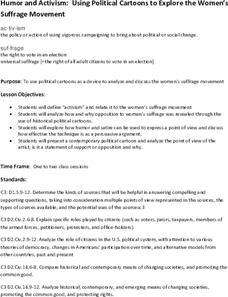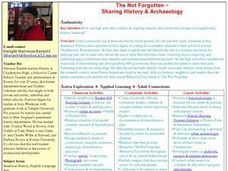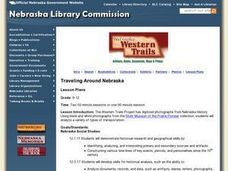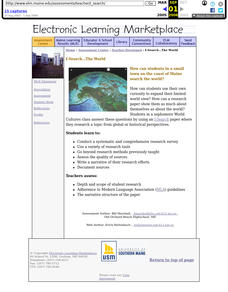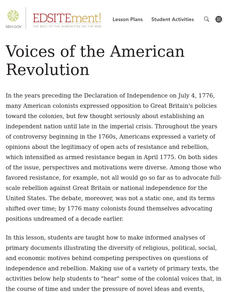Stanford University
Arabian Peninsula
How do cultural differences affect our view of history? The assessment geared towards high school historians, focuses on the credibility of primary sources. Young academics analyze a text and complete short answer questions to determine...
National Woman's History Museum
Humor and Activism
As part of their study of the women's suffrage movement, groups analyze political cartoons and drawings. They create a caption for an image from the time, add an exhibit label that provides a context for their drawing, and post as part...
National Endowment for the Humanities
James Madison: Madison Was There
Madison was there! Scholars go on a journey to discover the person behind the founding father label as they explore James Madison's role in the formation of the United States government. The culmination is a writing assignment and...
Smithsonian Institution
Students’ Response to 9/11—A Documentary Report
Young historians research the devastating attacks of 9/11 and use that information to script their own documentaries. The follow-up activity includes recording the documentary and conducting classmate interviews,
University of California
Roots of the Cold War
When and how did the Cold War begin? To answer this question, you will not find a better-organized, in-depth, activity- and inquiry-based resource than this! Executing best teaching practices throughout, each portion of this inquiry...
John F. Kennedy Presidential Library & Museum
Analyzing the Inaugural Address
Get high school historians to step outside their own shoes by responding to JFK's inaugural address from the perspective of a civil rights activist, a soviet diplomat, or a Cuban exile. After a class discussion about the address, the...
Smithsonian Institution
Changing Gender Roles on the Home Front
Many historians discuss how gender roles changed because of World War II, but how did this come to be? An informative resource challenges scholars to do some digging and research the information for themselves. They research how...
National Endowment for the Humanities
Chronicling America: Uncovering a World at War
As part of a study of World War I, class members read newspaper articles from the time that urge American involvement, non-involvement, or neutrality. Using the provided worksheet, groups analyze the articles noting the central argument...
Rockefeller Archive Center
Understanding Mass Media News
In an age of fake news and photoshopped images, it is vital that 21st century learners development the skills they need to evaluate mass media and assess its validity. A great way to launch such a study is with a carefully crafted lesson...
Curated OER
Lest We Forget
Students engage in historical and community research to discover facts about those who served in the First World War. Names of service persons are collected from a variety of sources and research skills applied to gather and publish the...
Curated OER
the Not Forgotten - Sharing History & Archaeology
Students create a catalog of gravestones in a cemetery that includes a burial ground from the Revolutionary War. They photograph and document the grave sites, research the Battle of Bunker hill and work with community members to create...
Curated OER
The People of Kansas
Students investigate primary sources to experience first- hand accounts of Kansas pioneers. They write an historical fiction letter or skit based on territorial documents.
Curated OER
Traveling Around Nebraska
Students analyze a current or historical photograph from their textbook and as a class complete a worksheet of the analysis. Using the Photographic Analysis Form, they locate and analyze two transportation photographs and use the...
Curated OER
Bill of Rights: Shapers of Meaning
Students review the Bill of Rights as a class. In groups, they use the internet to research the contributions made by historical figures in forming these rights. They create a poster showing the information they collected and present...
Curated OER
I - Search... The World: World Cultures, Global History
Students research and write a paper on a student chosen topic that has global and historical perspectives.
Curated OER
Using Primary Documents: The 1906 San Francisco Earthquake
Learners examine primary documents from various key historical events, including those from the 1906 San Francisco earthquake. They discuss the importance of such documents.
Curated OER
Captain John Smith's Chesapeake Bay
Young scholars conduct research to determine how the Chesapeake Bay has changed since the 17th century when Captain John Smith first explored it. Students read from Smith's historical documents.
Curated OER
The Metaphysics of Sex
Students compare and contrast the sex roles the portraits historically document to the meres of today. They make collages of marriage diptychs in terms of their own values, perceptions, and aspirations. They compare the portrait and...
Curated OER
From Forest to Farm and Back Again
Pupils review and discuss a given set of questions regarding ecosystems. They analyze essays, maps and historical documents on timber harvesting and regeneration and then complete worksheets.
Curated OER
Negro Leagues Baseball: Its Rise and Demise
Students identify the various Negro Leagues from 1920-1948 researching the Negro Leagues through the Internet, textbooks, novels, and historical documents. They then identify inception dates, elements contributing to failure, and the...
Curated OER
Beyond the Playing Field -Jackie Robinson, Civil Rights Advocate
Students examine and discuss documents pertaining to issues of the civil rights movement.
Curated OER
PARAMILITARY VIOLENCE AND THE CONFLICT IN NORTHERN IRELAND
Students examine documents to reconstruct the past, employ processes of critical historical inquiry to reconstruct the past, analyze aspects of the Northern Iereland conflict through perspectives of documents, and write a short position...
Curated OER
Voices of the American Revolution - Primary Documents
Students use primary documents to examine the attitudes and positions of several factions leading up to the American Revolutionary War. They read documents, debate differing perspectives and write an essay exploring the reasons for revolt.
Curated OER
Understanding the Declaration of Independence
Middle schoolers identify and interpret the Declaration of Independence and the rights and privileges demanded in the document. They also identify how those rights and privileges have affected our history. Students then research about...



